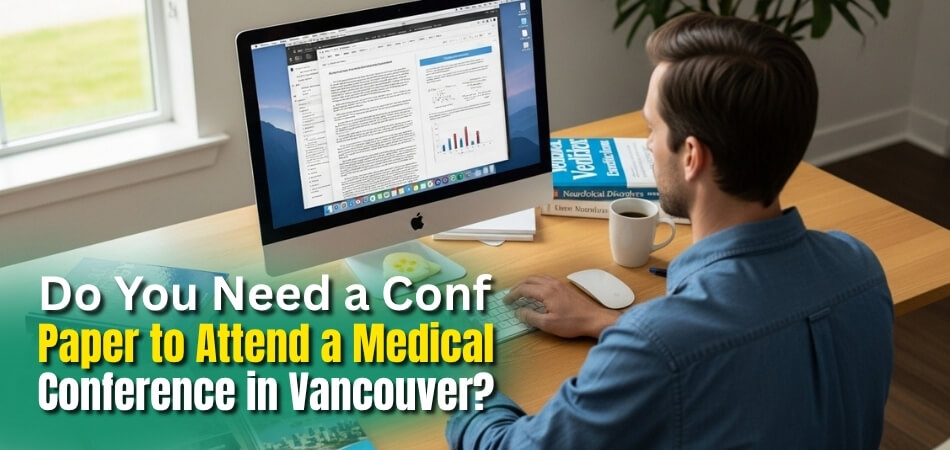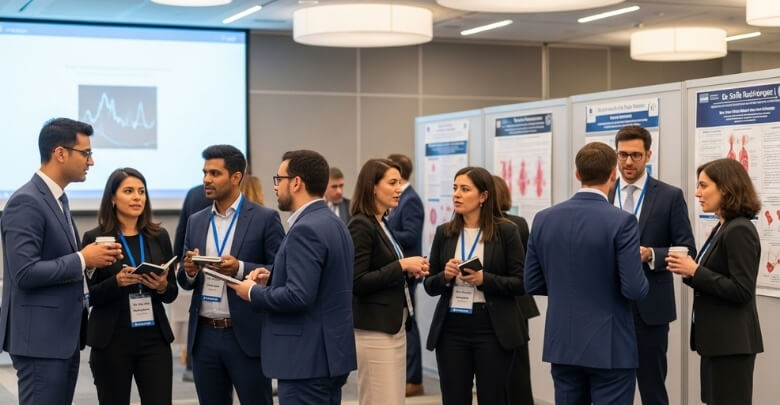You can meet new people, learn new things, and stay up to date on medical issues by attending a medical conference in Vancouver. These events bring together doctors, students, and health experts from many places. They are useful even if you don’t plan to share your own research.
So, the questions that might come to your mind: Do you need a conference paper to attend a medical conference in Vancouver?
You do not need a conference paper to attend a medical conference in Vancouver. You can join as a listener by registering and paying the fee. A paper is only needed if you want to present. All attendees must register and have a passport or visa if needed.
If you would like to learn more about how to join and make the most of the event, keep reading!
Do You Need a Conference Paper to Attend a Medical Conference in Vancouver?
No, you do not need a conference paper to attend a medical conference in Vancouver. Anyone can register and join as a listener without presenting. A paper is only needed if you want to present or be an author. Attendees must still follow travel, registration, and event rules carefully to take part. Here are some factors that you should keep in mind:
Registration Rules
Every attendee must complete a conference registration before joining any session or workshop. This step confirms your entry into the event. Without registration, you cannot take part or gain access to conference programs.
Conference organizers usually set different fees for listeners and presenters. Presenters often pay higher fees due to extra responsibilities. Listeners pay a smaller fee but still gain full access to sessions and discussions.
Paper Requirement for Presenters
A paper is needed only when you plan to present your own research or findings. Presenters must submit their work early for review. This ensures that conference organizers approve the material before including it in the schedule.
The submission process often requires strict deadlines that presenters need to meet. Missing a deadline could block your chance to present. Careful preparation of content ensures you are ready for the academic spotlight.
Benefits of Attending as a Listener
Listeners enjoy the event without the pressure of presenting or defending research. They can focus on learning and networking. This approach often suits students, beginners, or professionals exploring new areas.
Attending as a listener helps build professional connections with experts. You can ask questions and join group discussions. Many participants choose this role to expand their knowledge without the stress of presenting.
Travel Documents and Visa Needs
Travel documents, such as a passport, are essential when attending international conferences. If required, you must also secure a visa. Failing to prepare these documents can stop your trip before it even starts.
Visa requirements vary depending on your country of origin. Some applicants face lengthy processes, so early preparation is wise. Without valid travel papers, you cannot legally enter Canada for the conference.
Travel and Accommodation
Booking travel and accommodation well in advance saves both money and stress. Conferences attract many people, and hotels fill quickly. Planning ahead ensures you stay close to the event venue.
Airline prices also rise closer to the event date. Reserving tickets earlier helps keep costs manageable and affordable. Conference organizers sometimes share discounted hotel options, so watch for those deals.
Professional Attire Expectations
Medical conferences are formal events where professional attire is expected. Dressing correctly helps create a respectful image during sessions. Proper clothing can also make networking interactions smoother and more effective.
Wearing business suits, formal dresses, or neat medical uniforms is common. This shows respect for the speakers and audience. A polished appearance supports your credibility in professional gatherings.
Access to Sessions and Keynotes
Once registered, you can attend lectures, workshops, and keynote speeches. These sessions provide insights into new medical advancements. You gain access whether you are a presenter or a listener.
The variety of sessions creates opportunities to explore different fields. You can select topics that align with your interests. Many people attending conferences in Vancouver find these sessions the most valuable.
Networking Opportunities
Conferences bring together diverse medical professionals. Listeners and presenters meet during breaks, workshops, and discussions. These interactions often lead to valuable academic and professional relationships.
Networking also creates chances for mentorship or collaborations. Meeting like-minded professionals supports long-term career growth in medicine. Each event can plant seeds for future projects and achievements.
What Can You Expect from Attending a Conference Even Without Presenting a Paper?
Joining a medical conference without presenting a paper still gives plenty of benefits. You can listen, learn, and connect with experts from many places. These experiences shape your growth and open new opportunities for your future. Here are the things you can expect from a medical conference, even without submitting a conference paper:
Access to Valuable Knowledge
- Conference sessions deliver updated medical ideas that keep your learning sharp and relevant. Every lecture provides deeper perspectives on today’s challenges.
- Attendees can explore several tracks that highlight innovations, methods, and results. This broad exposure creates lasting professional understanding across disciplines.
Networking with Professionals
- Meeting professionals builds long-term contacts that strengthen your academic and career growth. Conferences offer chances for practical collaborations worldwide.
- Friendly conversations during breaks often open unexpected doors. Shared interests form strong bonds and encourage future research exchanges.
Inspiration from Keynote Speeches
- Keynote speakers share motivating stories and practical experiences. Their words often inspire attendees to reimagine their career directions.
- By attending these speeches, participants gather insights that change their views. Inspiration from successful figures sparks new commitments.
Skill Development Opportunities
- Workshops train participants in practical skills, from data analysis to clinical techniques. Learning directly builds confidence and lasting mastery.
- Hands-on activities ensure knowledge retention through real engagement. These sessions encourage active participation that strengthens overall professional competence.
Exposure to Research Trends
- Conferences highlight current discoveries shaping medicine today. Participants witness emerging technologies and new scientific frameworks firsthand.
- Observing presentations helps attendees recognize patterns across studies. This exposure develops broader awareness about industry needs and shifts.
Career Growth Possibilities
- Attending increases visibility among peers and senior experts. Recognition during interactions often supports long-term advancement opportunities.
- Career pathways open through mentoring relationships formed here. Discussions with experienced professionals shape personal development strategies effectively.
Exploring Different Perspectives
- Meeting people from other countries broadens awareness about healthcare practices. Exposure to diversity reshapes approaches and strengthens understanding.
- Listening to cultural perspectives during group discussions encourages open-mindedness. Different ideas challenge thinking and spark innovative approaches.
Who Usually Submits Conference Papers to Attend Medical Conferences?
Medical conferences are exciting events where many people come together to share knowledge and ideas. These gatherings bring professionals, students, and researchers into one space filled with discussions and learning. Everyone has a chance to contribute something meaningful to the group. Here are those who usually submit papers to attend:
Researchers and Scholars
Researchers often lead the way when it comes to conference papers. They work in hospitals, labs, and universities where new studies are happening every day. These researchers present their findings to help others understand important results. Their work helps bring new methods, treatments, and technologies to light.
Graduate Students
Graduate students also play a big part in medical conferences. Many share papers based on their master’s or doctoral projects. They use conferences to practice presenting their ideas to larger audiences. Sharing their work builds confidence and often helps them receive helpful feedback.
Medical Professionals
Doctors, residents, and interns also write papers for conferences. They present case studies or research they have worked on. These professionals talk about real experiences from hospitals and clinics. Including eligible participants for medical conference in Vancouver helps show that medical experts from many levels are welcome.
Faculty Members
Professors and faculty members often encourage students to submit papers while presenting their own research as well. Their experience makes them strong contributors during sessions. Faculty members use conferences as a platform to share teaching methods and scientific studies. They also inspire the younger crowd through meaningful guidance.
Health Science Experts
Beyond doctors and researchers, other health experts also bring papers. Nurses, public health workers, and biomedical scientists join the stage. They provide valuable insights into areas outside direct medical practice. Their contributions expand the learning and make conferences more diverse and useful.
How to Prepare if You Are Submitting a Conference Paper?
Writing and submitting a conference paper can feel exciting but also a little scary at first. Many people get nervous about deadlines and requirements, especially if it is their first time preparing. Conferences give you a chance to share your ideas clearly. With the following steps, the process becomes easier and more organized.
Know the Rules
Every conference sets its own rules for paper submissions. You need to check the word limit, style, and deadline. Reading the guidelines carefully will save you from mistakes later. Following them also shows respect to the organizers.
Choose a Topic
Picking the right topic is very important for your paper. Select something you are confident and passionate about. A good topic keeps you motivated while writing. It also makes your presentation more interesting for the audience.
Do Strong Research
Strong research makes your paper stand out from others. Use trusted sources like journals, books, and official reports. Always keep notes while reading so you can use them later. Good research gives your ideas more strength and value.
Write Clearly
Your writing should be simple and easy to understand. Avoid long and confusing sentences in your paper. Break information into clear sections like introduction, body, and conclusion. This makes your work easier to read and follow.
Edit and Review
Never submit your first draft without checking it again. Editing helps you spot mistakes in grammar or flow. Asking a teacher or friend to review can be very helpful. Fresh eyes often catch things you might have missed.
Practice Presentation
If your paper gets accepted, you may present it. Practice speaking in front of a mirror or with friends. Time yourself so your talk does not go too long. Confidence comes with practice and preparation.
Prepare Documents
Along with your paper, keep other documents ready. This can include your registration form, ID, or travel details. Having these things organized avoids last-minute stress. A smooth process makes your experience much better.
Common Mistakes to Avoid as an Attendee
Attending a conference is an exciting opportunity to learn new things and meet inspiring people. Many participants, however, often repeat small mistakes that reduce their overall experience. Avoiding these mistakes can help you enjoy every moment without stress. Being prepared and aware ensures your time at the event is valuable and fun.
- Late Registration: Delaying your registration often leads to missing important workshops. Early registration ensures access to popular sessions and better travel planning.
- Ignoring the Schedule: Not checking the event schedule carefully makes you miss valuable sessions. Staying organized helps you attend sessions most relevant to you.
- Skipping Breaks: Forgetting to take breaks can leave you tired during important talks. Resting between sessions helps keep your energy steady.
- Poor Networking: Talking only with friends limits your chances of meeting new people. Introducing yourself to strangers builds meaningful professional connections easily.
- Lack of Preparation: Arriving without reading about the speakers leaves you unprepared for discussions. Preparing in advance helps you ask smart and engaging questions.
- Improper Attire: Wearing casual clothes might feel comfortable, but it looks unprofessional. Dressing appropriately helps create good impressions with experts and professionals.
- Ignoring Notes: Not taking notes during talks makes you forget important details later. Writing down key points helps you remember ideas clearly.
Tips for Networking and Learning at Medical Conferences
Medical conferences bring together students, professionals, and researchers who are eager to share ideas and experiences. These events create exciting opportunities for learning and building connections. Many people attend to meet experts and discover new knowledge in different areas. With these approaches below, the experience becomes even more rewarding.
Start with Preparation
Before attending, read about the conference program and speakers. Knowing who is presenting helps you choose the right sessions. Carry a notebook or digital app for writing quick points. Preparation helps you feel more confident and less nervous.
Ask Simple Questions
During talks, don’t hesitate to raise your hand and ask. Simple questions show interest and encourage speakers to explain more. Others may also learn from the same question. This makes you stand out as an active participant.
Join Small Groups
Conferences often include small group discussions or workshops. These are great chances to share your thoughts freely. Smaller groups make it easier to talk without feeling shy. You will meet people who share similar interests.
Use Break Times
Breaks between sessions are perfect for short conversations. Approach someone new and introduce yourself politely. A friendly smile can open many doors. Some of the best connections happen outside formal sessions.
Attend Social Events
Many conferences host dinners or casual events in the evenings. These settings are relaxed and easy for meeting people. You can talk about hobbies, not just medicine. Friendships often begin at these fun activities.
Manage Your Budget
Planning your budget makes attending easier and stress-free. Keep in mind that the cost to attend a medical conference in Vancouver includes registration, travel, and stay. Saving early helps you avoid last-minute money worries. Smart planning allows you to focus on learning.
Share Contact Details
After meeting someone, share your email or social media. This helps you stay connected even after the conference ends. A quick follow-up message keeps the connection alive. Many future opportunities come from keeping in touch.
FAQs About Paper Submission Necessity for Medical Conference in Vancouver
Attending a medical conference in Vancouver can raise many questions, especially for first-time participants. Some worry about papers, while others think about travel, registration, or participation. Here are answers to common questions you may still have.
Can I Still Gain Value Without Presenting a Paper?
Yes, attending without presenting a paper still gives you access to workshops, keynote speeches, and networking. You can learn from professionals, observe new medical ideas, and connect with peers. Many attendees join simply to listen and gain knowledge.
Do Listeners Have Access to All Sessions?
Listeners with registration enjoy full access to sessions, panels, and keynote talks. They can choose topics that interest them most. The only difference is that they do not present their work, but still enjoy learning opportunities throughout the event.
Are There Different Fees for Presenters and Listeners?
Yes, conferences usually charge separate fees for presenters and listeners. Presenters often pay more due to submission processing. Listeners pay a lower registration fee but still enjoy complete access. Always check the official conference website for exact fee details.
Do I Need Special Qualifications to Attend as a Listener?
No, listeners do not need advanced qualifications to attend. Anyone interested in medicine, healthcare, or learning can register. Students, professionals, and even general participants are welcome. The main requirement is registering and ensuring travel documents are in order.
Can I Switch From Being a Listener to a Presenter?
Usually, this depends on deadlines set by conference organizers. If submission dates have passed, switching becomes impossible. If deadlines remain open, you can register as a presenter instead. Always contact the organizers directly to confirm possible changes.
What Documents Do I Need to Carry for Attendance?
All attendees must carry a valid passport, and if required, a Canadian visa. Registration confirmation is also necessary. Keeping hotel booking and travel details helps. Carrying personal identification ensures smoother entry into sessions and conference-related events without delays.
Do Listeners Receive Certificates of Attendance?
Yes, most medical conferences provide certificates of attendance to all registered participants, including listeners. These certificates confirm your participation and learning. They can be useful for resumes, academic records, or professional development. Always check specific conference details for confirmation.
Can I Network Effectively Without Presenting a Paper?
Absolutely, networking does not depend on presenting. Attendees can meet experts, ask questions during discussions, and connect during breaks. Many professionals build strong contacts this way. Sharing interests and engaging politely helps create meaningful relationships during the conference experience.
Final Considerations
Attending a medical conference in Vancouver can be a great way to learn, connect, and grow. You can join as a listener to attend sessions, workshops, and keynotes, or present if you submit a paper.
Many people ask, do you need a conference paper to attend a medical conference in Vancouver, and the answer is no, unless you plan to present. What matters most is registering, keeping your travel papers ready, and showing up with interest. No matter your role, the event can help you gain useful knowledge and meet people who share your goals.








